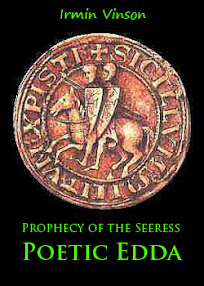Irmin Vinson - Prophecy of the Seeress Poetic Edda (283.0 Kb)
 Book downloads: 348
Book downloads: 348
Voluspa, which opens the Old Norse Poetic Edda, was likely composed in Iceland shortly before AD 1000 during a period of transition when Christianity was replacing the traditional beliefs of the North. The poem's anonymous author seems to have conceived Voluspa as a literary response to the decline of the old religion, a reassertion of the old gods in the face of their imminent demise as objects of living worship.Voluspa's allusive and often elliptical style implies the poet's expectation that his audience would be intimatel... More >>>Book can be downloaded.
Note that, unfortunately, not all my books can be downloaded due to the restrictions of copyright. However, most of the books on this site do not have copyright restrictions. If you find any copyright violation, please contact me at  . I am very attentive to the issue of copyright and try to avoid any violations, but on the other hand to help all fans of magic to get access to information.
. I am very attentive to the issue of copyright and try to avoid any violations, but on the other hand to help all fans of magic to get access to information.
If you are having difficulty downloading books, or you are looking for a book that is not on the site (but maybe it is in my home library), please write me a email to

and I will try to help, I can send the book by e-mail
darkbooks.org began in early 2008 I am happy to donate my time to providing you this resource, I would also like to note, that, although I try, I do not always have enough time to deal with the site, including, unfortunately, I do not always have time to answer all letters, because I have to earn money for a living. If you can financially help me, it would free me from the worries of earning money for living, perhaps partially, but ideally completely, then all 100% of my time could be devoted to the site. Also I do pay monthly web server/files storage and hosting costs to keep this site on the air. Please consider making a donation to help me continue this activity and devote more time to it or at least offset the cost of paying for storage/hosting. Even a small contribution helps!
Voluspa, which opens the Old Norse Poetic Edda, was likely composed in Iceland shortly before AD 1000 during a period of transition when Christianity was replacing the traditional beliefs of the North. The poem's anonymous author seems to have conceived Voluspa as a literary response to the decline of the old religion, a reassertion of the old gods in the face of their imminent demise as objects of living worship.Voluspa's allusive and often elliptical style implies the poet's expectation that his audience would be intimately familiar with the tales and cosmology of Northern paganism.
Two complete versions of Voluspa are extant: The best is in the Codex Regius, which dates to the thirteenth century, and there is another, with some significant variations and four additional strophes, in the Hauksbok manuscript. Extensive quotations also appear in the Gylfaginning ("The Deluding of Gylfi") of the Icelandic antiquarian Snorri Sturluson (1179-1241). The translation below is based on Neckel and Kuhn's standard edition of the Edda (Heidelberg: Carl Winter, 1983).
In the poem's dramatic context (see sts. 28-29) Odin has just questioned the Seeress (a volva, lit. "wand-bearer," a woman who carries a magical staff) about the past and especially the future, and Voluspa (the Prophecy or Soothsaying of the Volva) is her spoken reply, directed to both gods ("the hallowed kindred") and mankind ("Heimdall's children").



 Book downloads: 348
Book downloads: 348
 . I am very attentive to the issue of copyright and try to avoid any violations, but on the other hand to help all fans of magic to get access to information.
. I am very attentive to the issue of copyright and try to avoid any violations, but on the other hand to help all fans of magic to get access to information.
 and I will try to help, I can send the book by e-mail
and I will try to help, I can send the book by e-mail